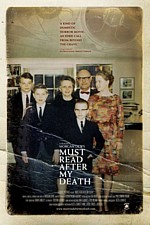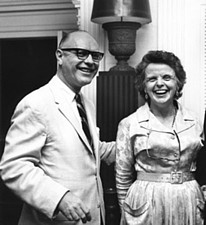
"Knight Thoughts" - exclusive web content
Morgan Dews' documentary rips the lid off old family secrets - but should he have shared it with the world?
Revolutionary Road For Real:
Must Read After My Death
2-20-09 "Knight Thoughts" web exclusive
By Richard Knight, Jr.
Must Read After My Death
2-20-09 "Knight Thoughts" web exclusive
By Richard Knight, Jr.
Several years ago I conceived the idea of writing a biography of my parents which focused mostly, naturally, on their married life and
children. They were both a tad wary when I suggested the project but eventually became enthusiastic over the many months that I
conducted interviews with them. All this was done in secret – I intended the finished book to be a Christmas present for my siblings
and the rest of the immediate family – and a way for me to honor my parents for the tremendous example they’d set for us. I was
pretty sure my family members would react favorably when they were each presented with the book but to say they were
overwhelmed was an understatement. But overriding their reaction was a condition that my mother insisted upon: no one outside
our immediate family was to read the book. “This is just for our family – no one else” she insisted, eliciting promises from everyone
to keep it within the inner circle – for always.
I have thought about this personal biography each time I’ve watched Morgan Dews’ Must Read After My Death, a documentary
that Dews assembled from a voluminous cache of home movies, photographs, and especially audio tapes that his grandmother Allis
left behind after her death. Dews, as he has stated in many interviews, became fascinated by the material and who can blame him?
The lives of Allis and Charlie played out like a real life version of Revolutionary Road about ten years on – from the early promise to
the swinging, liquor slicked, wife swapping parties, down to the bitter dissolution, aided – it would seem – by a reliance on
psychotherapy. This tale of suburban angst eventually swallows up the children of Allis and Charlie and a reliance on psychotherapy
and the unseen Dr. Lenn whose hold on Allis reminds one of that between the narcissistic poet and her pill prescribing therapist
played by Annette Bening and Brian Cox in Running With Scissors.
Actually, it’s the unseen Dr. Lenn who truly fascinates with his rather odd insistence that Allis tape all her feelings and those of her
ever increasingly screwed up teenagers. He’s really the villain of the piece but tantalizing questions about his approach to therapy,
how he came to have such a hold over the family, etc. are left unexplored. This is because Dews approach doesn’t allow for any
release from the vise-like grip that Allis with her constant fretting wields on the movie – something that would have helped the film.
After awhile one desperately needs to escape from this hermetically sealed world – not just because of Allis’ endless stream of
psychological pain and sadness but also because the raw nature of the aural confessions become embarrassing for the viewer – who,
in this case, felt like he was witnessing and listening to stuff that maybe should have remained behind closed doors.
Must Read After My Death is beautifully assembled and Dews displays real filmmaking gifts but the invasive nature of the material
eventually leads one to tune it out and ponder instead about Dews’ willingness to share his grandmother’s pain with strangers. After
all, Allis’ instructions were “Must Read After My Death,” not “Must Release This Material For Public Consumption.” The movie is
available via direct download for $2.99 at www.giantdigital.com.
children. They were both a tad wary when I suggested the project but eventually became enthusiastic over the many months that I
conducted interviews with them. All this was done in secret – I intended the finished book to be a Christmas present for my siblings
and the rest of the immediate family – and a way for me to honor my parents for the tremendous example they’d set for us. I was
pretty sure my family members would react favorably when they were each presented with the book but to say they were
overwhelmed was an understatement. But overriding their reaction was a condition that my mother insisted upon: no one outside
our immediate family was to read the book. “This is just for our family – no one else” she insisted, eliciting promises from everyone
to keep it within the inner circle – for always.
I have thought about this personal biography each time I’ve watched Morgan Dews’ Must Read After My Death, a documentary
that Dews assembled from a voluminous cache of home movies, photographs, and especially audio tapes that his grandmother Allis
left behind after her death. Dews, as he has stated in many interviews, became fascinated by the material and who can blame him?
The lives of Allis and Charlie played out like a real life version of Revolutionary Road about ten years on – from the early promise to
the swinging, liquor slicked, wife swapping parties, down to the bitter dissolution, aided – it would seem – by a reliance on
psychotherapy. This tale of suburban angst eventually swallows up the children of Allis and Charlie and a reliance on psychotherapy
and the unseen Dr. Lenn whose hold on Allis reminds one of that between the narcissistic poet and her pill prescribing therapist
played by Annette Bening and Brian Cox in Running With Scissors.
Actually, it’s the unseen Dr. Lenn who truly fascinates with his rather odd insistence that Allis tape all her feelings and those of her
ever increasingly screwed up teenagers. He’s really the villain of the piece but tantalizing questions about his approach to therapy,
how he came to have such a hold over the family, etc. are left unexplored. This is because Dews approach doesn’t allow for any
release from the vise-like grip that Allis with her constant fretting wields on the movie – something that would have helped the film.
After awhile one desperately needs to escape from this hermetically sealed world – not just because of Allis’ endless stream of
psychological pain and sadness but also because the raw nature of the aural confessions become embarrassing for the viewer – who,
in this case, felt like he was witnessing and listening to stuff that maybe should have remained behind closed doors.
Must Read After My Death is beautifully assembled and Dews displays real filmmaking gifts but the invasive nature of the material
eventually leads one to tune it out and ponder instead about Dews’ willingness to share his grandmother’s pain with strangers. After
all, Allis’ instructions were “Must Read After My Death,” not “Must Release This Material For Public Consumption.” The movie is
available via direct download for $2.99 at www.giantdigital.com.


